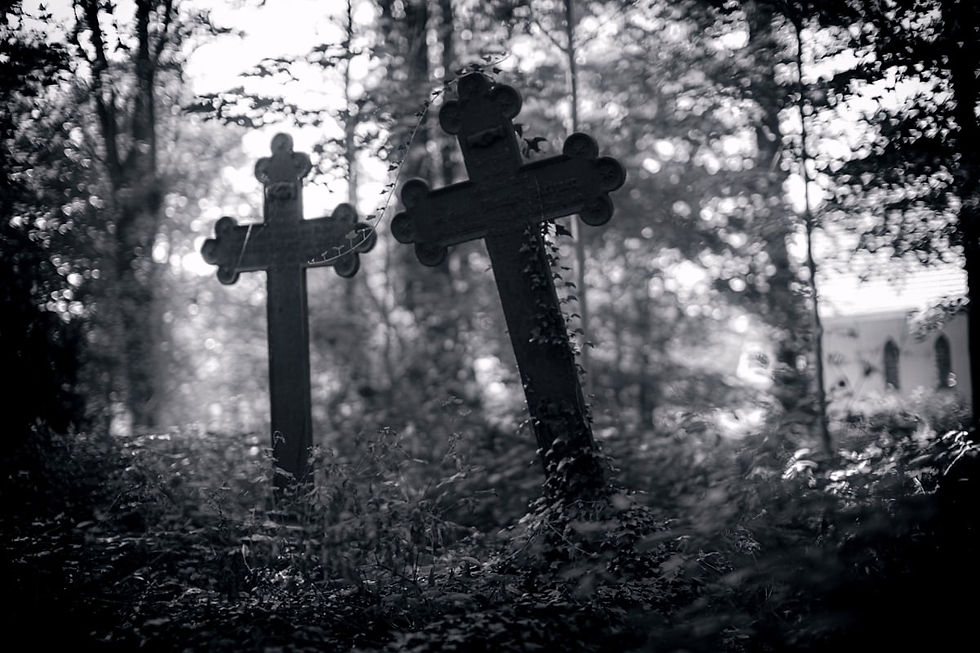The Psychological Causes of Thanatophobia: Childhood, Trauma, and Existential Anxiety
- Emma Calden
- 5 days ago
- 7 min read

Thanatophobia, commonly referred to as the fear of death, is an anxiety disorder that affects individuals of all ages, often with debilitating effects on their quality of life. While the fear of death is a natural and universal human experience, for some, this fear becomes overwhelming, chronic, and irrational. Understanding the psychological causes of thanatophobia is crucial in helping individuals overcome the fear and manage the anxiety associated with it. In this article, we will explore the psychological roots of thanatophobia, examining early life experiences, trauma, and existential anxiety as key factors that contribute to the development and exacerbation of this phobia.
Not sure if you have thanatophobia? Take our test!
Childhood Experiences and the Development of Thanatophobia
The psychological causes of thanatophobia can often be traced back to childhood. Early life experiences are crucial in shaping a person’s worldview, including how they perceive mortality and the concept of death. Fear of death in childhood is a natural and expected response to developmental stages, but when these fears become magnified or unaddressed, they may develop into a full-blown phobia in adulthood.
Cognitive Development and the Fear of Death in Childhood
Children, particularly those in the early stages of cognitive development, are often unable to fully understand the permanence of death. This limited understanding can result in intense, existential anxiety. During early childhood, children may fear separation from their caregivers or the unknown, and the concept of death can be difficult to grasp. When faced with death or the death of a loved one, a child might struggle to comprehend the finality of the event.

As children grow older, they begin to develop an understanding of mortality, but this awareness can also be a source of anxiety. The idea of non-existence can be profoundly unsettling, especially for children who are still forming their sense of identity and security. This is especially true for children who experience the loss of a loved one at a young age, as the emotional processing required to cope with such loss can overwhelm their cognitive abilities. In such cases, the fear of death may not be fully processed and can develop into a deep-seated fear that persists into adulthood.
The Role of Parental Influence in Childhood Fears
Parental influence plays a significant role in the development of thanatophobia. Parents’ own attitudes toward death and their responses to the child’s fears can directly impact the child’s perception of mortality. Children often model their fears and coping strategies based on the behaviors and emotional responses of their caregivers. If a parent is particularly fearful of death or demonstrates high levels of anxiety when discussing mortality, the child may internalize this fear. In some cases, the fear of death becomes a learned behavior passed down through generations, reinforcing the child’s perception that death is a threat or something to be afraid of.
The language and stories used by parents can also influence a child’s view of death. If a child is told frightening or negative stories about death, or if death is depicted as a mysterious and terrifying event, this can contribute to the development of thanatophobia. Children who are exposed to the idea that death is a punishment, a form of abandonment, or a frightening unknown are more likely to develop an irrational fear of it later in life. Even well-intentioned parental statements, such as "You’ll never see Mommy again when you’re dead," can contribute to a child’s fear of death if they do not have the cognitive capacity to understand the concept of death in a balanced, healthy way.
Trauma and Thanatophobia: How Traumatic Events Trigger the Fear of Death
Trauma is one of the most significant psychological factors contributing to the onset or exacerbation of thanatophobia. Individuals who experience traumatic events related to death—either directly or indirectly—are at a heightened risk of developing a phobia of death. The traumatic experiences that trigger thanatophobia can vary widely, but they often share common psychological themes, including a sense of powerlessness, a loss of control, or an overwhelming emotional response to death.
Direct Experience with Death and Loss
Experiencing the death of a loved one, especially at a young age, can be an intensely traumatic event that leaves a lasting emotional impact. Children who witness the death of a parent, sibling, or close family member may struggle to process their grief, leading to unresolved fears and anxieties about their own mortality. These experiences often result in a deep-seated fear of being separated from loved ones or the fear of losing their own life. The trauma of losing someone close can shape how a person views death, leading them to associate it with profound grief and emotional pain.

For adults, the loss of a partner, friend, or close relative can trigger similar fears. Adults who have lost loved ones to illness, accident, or violence may experience heightened anxiety about their own vulnerability, particularly if the death occurred suddenly or without warning. The lack of closure in such traumatic experiences can result in a heightened fear of the unpredictability of death. In some cases, people who have experienced significant loss may become hyper-aware of their own mortality, living in constant fear of the next loss or death that may occur in their lives.
Near-Death Experiences or Life-Threatening Illnesses
In addition to witnessing the death of others, individuals who experience a near-death event or face a life-threatening illness may develop thanatophobia as a result of the trauma associated with the event. For example, someone who survives a car accident, a serious health crisis, or an assault may become deeply fearful of death. The psychological impact of confronting one's own mortality in such an intimate way can lead to heightened anxiety about the fragility of life.
For some, surviving a near-death experience may bring a heightened awareness of the impermanence of life and a subsequent fear of dying. People who have lived through life-threatening situations may develop obsessive thoughts about their survival, or they may become fixated on the idea that death is imminent, even when there is no immediate threat. This existential anxiety can persist long after the event, influencing the individual’s thoughts and behavior for years to come.
Existential Anxiety: The Underlying Psychological Mechanism of Thanatophobia
In addition to trauma and early life experiences, existential anxiety plays a critical role in the development of thanatophobia. Existential anxiety refers to the discomfort or dread that arises when an individual contemplates the fundamental uncertainties of human existence, including the inevitability of death. Unlike the fear of death that is based on personal experiences, existential anxiety is often tied to a more abstract fear—fear of the unknown, the meaning of life, and the recognition that death is inevitable and beyond one’s control.
Awareness of Mortality and the Meaning of Life
As individuals age, they begin to confront the reality of their own mortality. For some, the awareness of the finite nature of life is a source of existential distress. This awareness can provoke deep existential questions such as: "What is the meaning of life?" "What happens after death?" "What is the purpose of my existence?" These questions can lead to an intense fear of death, particularly if the individual feels that their life lacks purpose or meaning.
In some cases, individuals may experience an existential crisis, a period of deep self-reflection and questioning about their values, purpose, and place in the world. This crisis can be triggered by life transitions such as aging, the death of loved ones, or significant life changes (e.g., a career change, divorce, or personal loss). The awareness that life is finite, combined with a lack of clear answers to the questions about life’s purpose, can lead to overwhelming feelings of anxiety, which in turn can contribute to the development or intensification of thanatophobia.
Fear of Non-Existence and the Unknown
One of the most profound psychological causes of thanatophobia is the fear of non-existence—anxiety about what happens after death. For many, the concept of non-existence is an insurmountable source of fear. Unlike other fears, which can be controlled or avoided, the fear of death is inescapable because it is an unavoidable part of the human experience. This fear may arise from the inability to understand what death truly means or the dread of the unknown. Without a clear understanding of what happens after death, individuals may become fixated on the idea that death is an existential void—a place where there is no consciousness, no meaning, and no experience.
The human inability to comprehend death fully, combined with religious, spiritual, or philosophical uncertainty, can create a deep sense of unease. This existential fear is not only about the process of dying but about the prospect of no longer "being" at all. For some, the thought of non-existence is so unsettling that it triggers intense anxiety and irrational fears that may persist throughout their lives.
Conclusion: The Psychological Causes of Thanatophobia
Thanatophobia is a complex fear that stems from a combination of early life experiences, traumatic events, and existential anxiety. The fear of death can be a normal response to the unknown or to personal loss, but for some, it becomes an overwhelming and persistent phobia. By examining the psychological causes of thanatophobia—such as childhood experiences, traumatic events, and existential anxiety—we gain insight into the mechanisms behind this fear and can begin to address and treat it effectively.
Therapeutic interventions, including cognitive-behavioral therapy (CBT), exposure therapy, and mindfulness practices, can help individuals confront their fear of death and reduce anxiety associated with it. Understanding the origins of thanatophobia empowers individuals to work through their fears in a meaningful and therapeutic way, leading to greater acceptance of mortality and the ability to live more fully in the present. Through therapy, self-reflection, and support, it is possible to manage and ultimately overcome the fear of death, enabling individuals to approach life and death with a sense of peace and clarity.
.png)










































